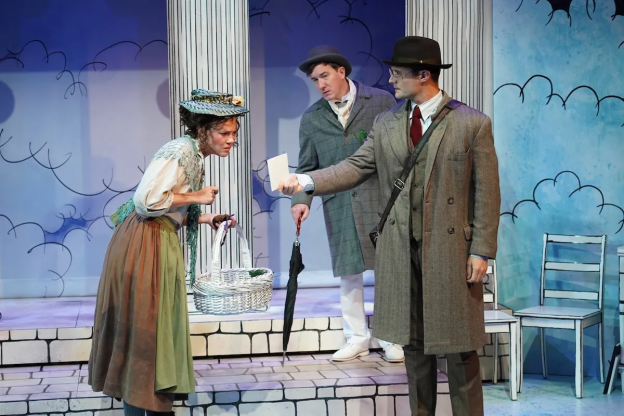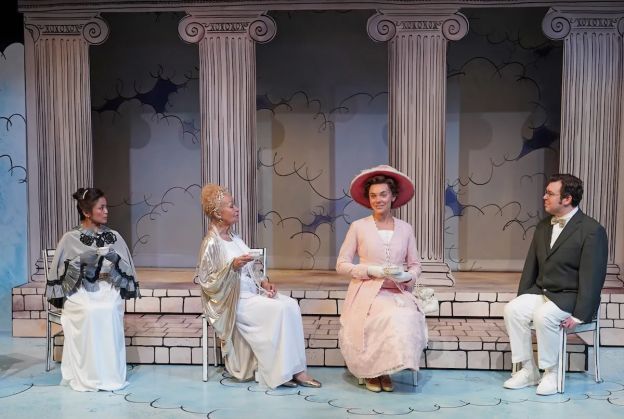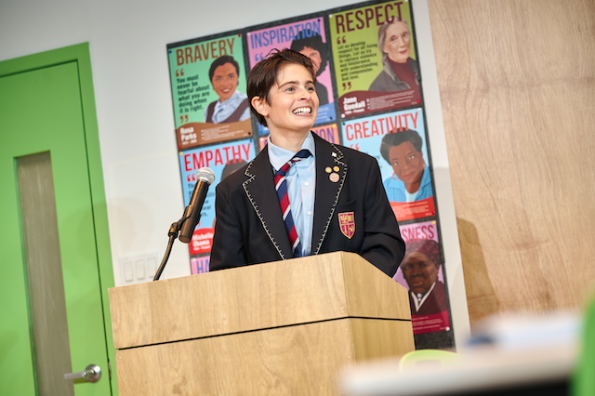
Synnøve Karlsen, Carson Elrod and Mark Evans (Photo: Carol Rosegg)
Pygmalion
By Fern Siegel
Sometimes, less is more.
Theater aficionados know George Bernard Shaw’s Pygmalion as the inspiration for the Lerner and Loewe musical “My Fair Lady.”
What’s less known is that Shaw based his work on a Greek myth. An artist prays for his marble sculpture to turn into a real woman — and Aphrodite grants his wish. The free–thinking playwright transformed that idea into Pygmalion, first performed on the London stage in 1914.
David Staller’s revival of Pygmalion, now off-Broadway on Theatre Row, adopts Shaw’s original draft for the later 1938 film. In it, four gods explain the caprices of humans and the overall themes addressed, a literary departure from later incarnations.
Henry Higgins, a pompous phonetics professor and linguist (Mark Evans), bets his friend Colonel Pickering (Carson Elrod) that in six months he can make Eliza Doolittle, a Cockney flower girl (Synnøve Karlsen) butchering the English language, sound like a duchess. To do so, Eliza must live with the pair and be subjected to rigorous schooling. While the play confronts class prejudice, women’s rights and Henry’s emotional frigidity, Staller’s revival, given the cosmic aspect, presents a different version of Pygmalion.
The deity addition was cut from the Leslie Howard-Wendy Hiller movie and the later 1945 Broadway production. And it isn’t necessary here. Shaw’s play is so good, resplendent with witty observations and humor, that no added instruction is required. One reason: The addition breaks the dramatic action, as the gods appear either as narrators or interpreters. (However, close attention to the script explains why it’s a natural for a musical.)
It’s worth noting that Shaw wrote various endings for Pygmalion. Hollywood insisted on a “happy ending” and united the duo. The play has her exit under her own steam, longing to be “a lady in a flower shop.” Eliza is a more fully formed human being than Higgins, who is unable to connect with others. Her goal is to exist as a self-sustaining woman, reflective of Shaw’s commitment to women’s rights. Eliza is not searching for a husband. Her newfound language skills afford her the chance for independence. She has no interest in catering to Higgins’ dictates.
On the plus side, Karlsen captures Eliza’s independent spirit with wisdom and glee, while Matt Wolpe nails her father, Alfred Doolittle, who deems himself part of the “undeserving poor.” A pontificator who disdains middle-class morality, he is eventually hoist with his own petard.
The rest of the cast is solid: Elrod as Pickering, social striver Clara (Teresa Avia Lim) and Evans, who nicely captures Higgins’ blustering and emotional disconnection. The one exception is the occasional misstep by Lizan Mitchell, who plays three roles: god, housekeeper and Henry’s mother. She sounds too Southern at times to evoke a British aristocrat.

Teresa Avia Liim, Lizan Mitchell, Karlsen, Matt Wolpe (Photo: Carol Rosegg)
The set is an adaptation of Al Hirschfeld’s images of G.B. Shaw, courtesy of scenic designer Lindsay Genevieve Fuori. Thus, Hirschfeld, billed in the notes as “a great pal” of director David Staller, is helping to celebrate Shaw for the Gingold Theater Group’s 20th anniversary. The caveat: The set doesn’t evoke London or the period, though Tracy Christensen’s period costumes are exactly right. Sound is by Julian Evans and lighting by Jamie Roderick.
What’s wonderful about the show is the feminist sensibility that Shaw proclaimed 111 years ago. Shaw himself wrote: “I am of the opinion that my life belongs to the whole community, and as long as I live, it is my privilege to do for it whatever I can.” Now, as women’s rights are under fire, and wit is in short supply, it’s terrific that Gingold and Staller revived Pygmalion.
Pygmalion
At Theater Row
410 W. 42 St.
Running time: 2 hours
Through November 22, 2025




